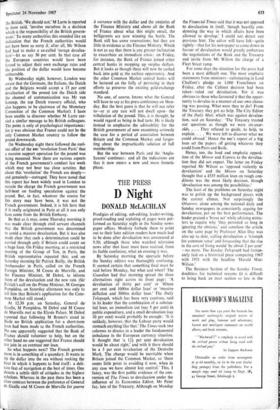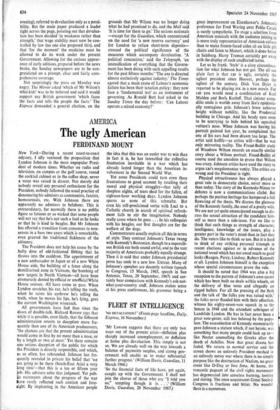D Night
THE PRESS DONALD McLACHLAN
Prodigies of editing, sub-editing, leader-writing, proof-reading and replating of pages were per- formed on Saturday night in the Sunday news- paper offices. Modesty forbade them to point out to their later edition readers how much had to be done after devaluation was announced at 9.30; although those who watched television news after that hour must have realised, from its feeble confusion, what an evening it was.
By Saturday morning the spectacle before the Sunday editors was thoroughly confusing. It seemed certain that something final must be said before Monday, but what and when? The Guardian had that morning spread the three alternatives right across its front page: `A devaluation of thirty per cent' or 'fifteen per cent and 1000m dollar loan' or 'massive deflation and 3000m dollar loan.' The Daily Telegraph, which has been very cautious, said in its leader that the combination of a substan- tial loan, an immediate cut (say 5 per cent) in public expenditure, and a small devaluation (say 10 per cent) would probably be enough : 'It is unlikely, however, that the Labour party would stomach anything like that.' The Times took two columns to discuss in a leader the fundamental imbalance in the European currency situation. It thought that 'a 12+ per cent devaluation would be about right,' and with it there should be a 5 per cent revaluation of the Deutsche Mark. The change would be inevitable when Britain joined the Common Market, so 'there seems little point in avoiding it now, when in any case we have almost lost control.' This, I fancy, was the first public evidence of the con- version of The Times to devaluation under the influence of its Economics Editor, Mr Peter Jay, late of the Treasury. Although on Monday
the Financial Times said that it was not opposed to devaluation in itself, 'though heartily con-
demning the way in which affairs have been allowed to develop,' I could not detect any previous hint. The editor will have felt—quite rightly—that for his newspaper to come down in favour of devaluation would greatly embarrass the negotiations of the Bank and the Treasury and invite from Mr Wilson the charge of a Fleet Street ramp.
For some days the situation for the press had been a most difficult one. The most emphatic statements from ministers—culminating in Lord Chalfont's pledge to 1,000 Frenchmen on Friday, after the Cabinet decision had been taken—ruled out devaluation. Yet it was obvious to those who favoured it that the oppor- tunity to devalue in a manner of our own choos- ing was passing. What were they to do? From the Treasury they got no help. The City Editor of the Daily Mail, which was against devalua- tion, said on Saturday: 'The Treasury treated our questions as though we were six-year- olds. . . . They refused to guide, to help, to explain. . . . We were left to discover what we could abroad.' Hence the sac's report of a big loan set the papers off getting whatever they could from Paris and Basle.
Hence, too, the loud and emphatic opposi- tion of the Mirror and Express to the devalua- tion they did not expect. The latter on Friday reported Mr Wilson as 'opposed violently to devaluation' and the Mirror on Saturday thought that a f535 million loan on tough con- ditions was the most likely decision, though `devaluation was among the possibilities.'
The least of the problems on Saturday night was to polish up the background pieces with the correct climax. Not surprisingly the Observer, alone among the national daily and Sunday newspapers in consistently arguing for devaluation, put on the best performance. The leader praised a 'brave act' while advising minis- ters to inquire why 'they persisted so long in ignoring the obvious,' and somehow the article on the same page by Professor Alan Day was also up to date, calling devaluation a 'triumph for common sense' and forecasting that the rise in the cost of living would 'be about 2 per cent' —no more. The Sunday Telegraph had fortun- ately laid on a historical piece comparing 1967 with 1931 with the headline 'Harold Mac- Wilson.'
The Business Section of the Sunday Times, doubtless for technical reasons (it is difficult to bring back an inset section so late in the evening), referred to devaluation only as a possi- bility. But the main paper produced a leader right across the page, pointing out that devalua- tion has been decided 'in weakness rather than strength,' that wage stability must now be con- trolled by law (no one else proposed this), and that 'for the moment' the medicine must be allowed to do its work under the present Government. Allowing for the curious appear- ance of early editions, prepared before the news broke, the Sunday newspapers are to be con- gratulated on a prompt, clear and fairly com- prehensive coverage.
Not surprisingly the press on Monday was angry. The Mirror asked 'which of Mr Wilson's whiz-kids' was to be believed and said it would support any British government 'which faces the facts and tells the people the facts.' The Express demanded a general election, on the grounds that Mr Wilson was no longer doing what he had promised to do, and the Mail said 'It is time for them to go.' The serious nationals —except for the Guardian, which concentrated on the need for 'a new reserve currency' and for London to refuse short-term deposits— stressed the political significance of the measures which accompany devaluation. 'A political concoction,' said the Telegraph, 'an intensification of everything that the Govern- ment has been doing with such appalling results for the past fifteen months."The axe is directed almost exclusively against industry.' The Times agreed that a main cause of Labour's economic failure has been their taxation policy : they now face a 'fundamental test' as an instrument of governing. As Ronald Butt had asked in the Sunday Times the day before : 'Can Labour operate a mixed economy?'















































 Previous page
Previous page